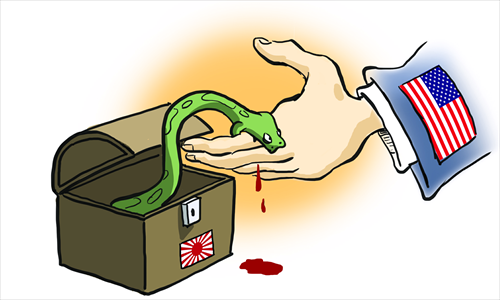HOME >> OP-ED
Abe's right-wing turn at his own peril
Source:Global Times Published: 2014-4-20 19:58:02

Illustration: Liu Rui/GT
The Japanese government adopted the new "three principles" on the transfer of defense equipment to replace the decades-old policy of arms export restrictions earlier this month.
The first major overhaul of its blanket weapons transfer policy in nearly half a century allows Tokyo to export arms and participate in joint development, research and production of weapons "only if they serve the purpose of contributing to international cooperation and security interests," as defined by the ruling party.
According to the new principles, Japan can also sell patrol vessels to countries along sea lanes in an aim to guarantee the safe flow of natural resources.
This move is widely viewed as a critical step by Japan to establish itself as a military power and then as a "normal state" unhindered by the pacifist restrictions adopted after WWII.
Therefore, easing the arms embargo policy opened the door to facilitate the far right in revising the pacifist constitution and exercising the right to collective self-defense.
The escalated tensions in East Asia have also prompted the Shinzo Abe administration to remove the self-imposed taboos and modernize its defense industry. The Japanese government is going all out to strengthen the country's military buildup.
However, there has long been a more urgent impetus for lifting the ban on arms sales: demand from domestic military corporations.
The Japanese government's rigorous policy on arms export, initiated in 1967, hindered the development of the defense industry. Weapons were mainly produced to cater to the needs of its Self-Defense Forces, restraining the country's technological base to a certain degree.
With a prolonged domestic economic slump and the international financial crisis, Japan has been in dire need of industrial capital that can hardly solely rely on developed civilian industries.
The Japan Business Federation submitted a proposal to the Abe government in February calling for the easing of the restrictions on arms sales.
As for the lifting of the sensitive taboo in Tokyo, there are speculations that Japan's position in its alliance with the US can be decisively reversed, but these can barely hold water.
Whether to remove the ban on collective self-defense is a much thornier issue within Japan's society than easing the "three principles" on arms export.
And at the very least, even if the Japanese government could exercise the right to collective self-defense, it is unlikely that its status in the US-Japan alliance be changed entirely. Other countries, including the UK and Israel, do not have such restrictions, but are they treated on an equal footing with Washington in their alliance with the greatest power in the world?
Some Japanese scholars view the modification of the arms export principles as a step of the Abe administration to shake off the influence and shackles of the White House in the postwar era. According to them, the current government led by President Barack Obama is not as reliable, especially with its blurred expression of the US position on the ownership of the disputed Diaoyu Islands and condemnation of Abe's pilgrimage to the Yasukuni Shrine.
This, they believe, is in strong contrast with the past US administrations that once pushed for the ease of the arms sales taboo, an increase in military expenditure and the right to collective self-defense in the No.1 US ally in Asia.
Now that Abe's cabinet seems ready to take risks to embark on a rightward path, the White House shows a somewhat contradictory attitude.
Augmenting military spending and strengthening the freedom of military maneuvers are conducive to the US presence in the Asia-Pacific region. On the other hand, however, the ambitions of and moves by the Japanese government has already brought about severe consequences, further sabotaging the almost frozen relations with its neighbors and aggravating the intensified tensions in East Asia, which is not in the interests of the US.
The international political landscape has changed with time. Washington is no longer in the hands of neoconservatives. It is an inappropriate time for Abe to go ahead on the right-wing path. And Tokyo's tough diplomatic policies toward Beijing may involve Washington in warfare in the Asia-Pacific region.
Without analyzing the present international scenario in a rational way, Abe's rightist moves will eventually lead to its own isolation.
The article was compiled by Global Times reporter Wang Xiaonan, based on an interview with Yan Shenghe, former Tokyo bureau chief of Guangming Daily and currently head of the newspaper's international desk. wangxiaonan@globaltimes.com.cn
Posted in: Viewpoint